The Role of Small Businesses
VerifiedAdded on 2020/06/03
|12
|3985
|31
AI Summary
This assignment delves into the significance of small businesses within the global economy. It examines their contributions to GDP, job generation, innovation, and community development. The text highlights the diverse nature of small enterprises, their impact on various sectors, and the challenges they face. Additionally, it touches upon the role of entrepreneurship education, immigration, and financial alternatives in shaping the landscape of small business ventures.
Contribute Materials
Your contribution can guide someone’s learning journey. Share your
documents today.

Entrepreneurship and Small Business
Management
1
Management
1
Secure Best Marks with AI Grader
Need help grading? Try our AI Grader for instant feedback on your assignments.
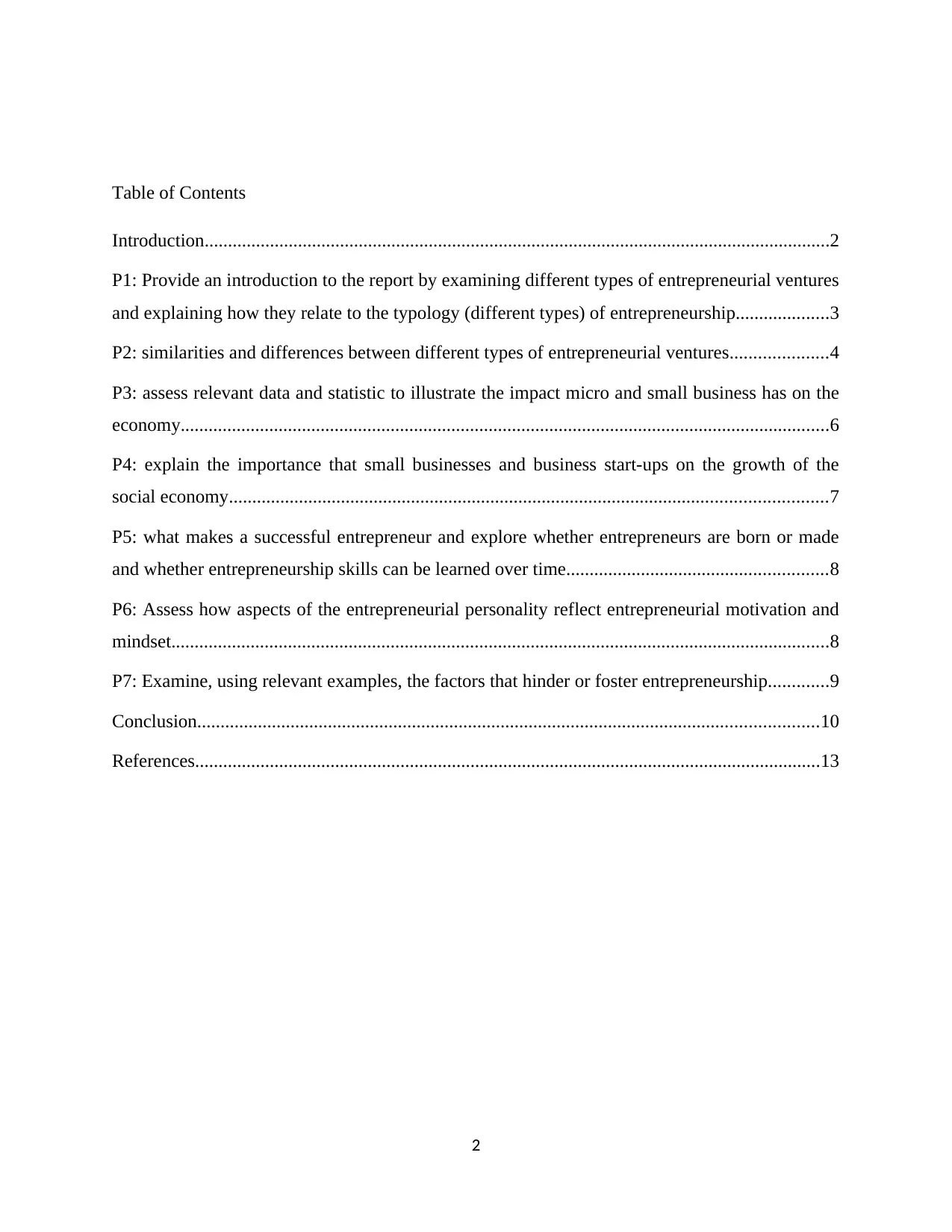
Table of Contents
Introduction......................................................................................................................................2
P1: Provide an introduction to the report by examining different types of entrepreneurial ventures
and explaining how they relate to the typology (different types) of entrepreneurship....................3
P2: similarities and differences between different types of entrepreneurial ventures.....................4
P3: assess relevant data and statistic to illustrate the impact micro and small business has on the
economy...........................................................................................................................................6
P4: explain the importance that small businesses and business start-ups on the growth of the
social economy................................................................................................................................7
P5: what makes a successful entrepreneur and explore whether entrepreneurs are born or made
and whether entrepreneurship skills can be learned over time........................................................8
P6: Assess how aspects of the entrepreneurial personality reflect entrepreneurial motivation and
mindset.............................................................................................................................................8
P7: Examine, using relevant examples, the factors that hinder or foster entrepreneurship.............9
Conclusion.....................................................................................................................................10
References......................................................................................................................................13
2
Introduction......................................................................................................................................2
P1: Provide an introduction to the report by examining different types of entrepreneurial ventures
and explaining how they relate to the typology (different types) of entrepreneurship....................3
P2: similarities and differences between different types of entrepreneurial ventures.....................4
P3: assess relevant data and statistic to illustrate the impact micro and small business has on the
economy...........................................................................................................................................6
P4: explain the importance that small businesses and business start-ups on the growth of the
social economy................................................................................................................................7
P5: what makes a successful entrepreneur and explore whether entrepreneurs are born or made
and whether entrepreneurship skills can be learned over time........................................................8
P6: Assess how aspects of the entrepreneurial personality reflect entrepreneurial motivation and
mindset.............................................................................................................................................8
P7: Examine, using relevant examples, the factors that hinder or foster entrepreneurship.............9
Conclusion.....................................................................................................................................10
References......................................................................................................................................13
2
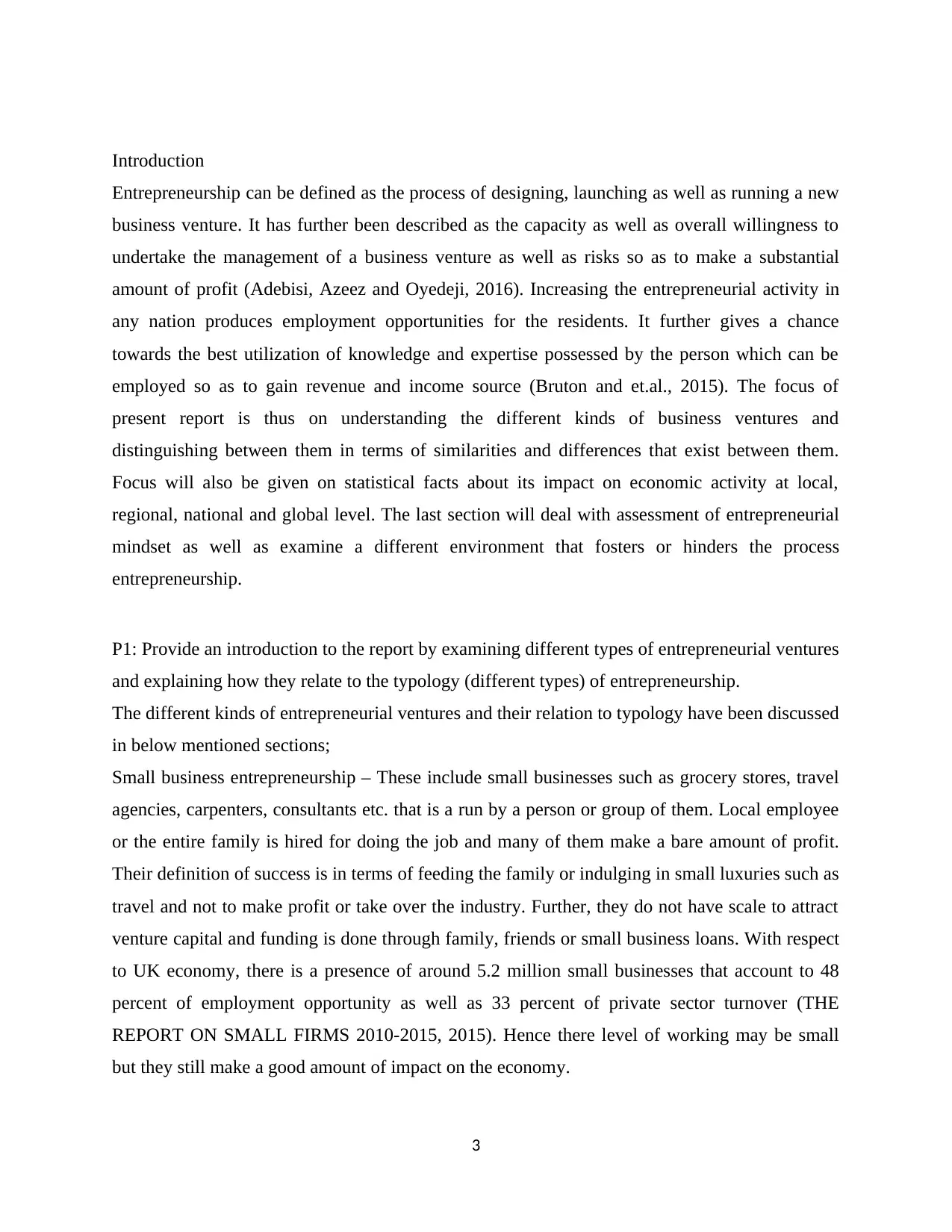
Introduction
Entrepreneurship can be defined as the process of designing, launching as well as running a new
business venture. It has further been described as the capacity as well as overall willingness to
undertake the management of a business venture as well as risks so as to make a substantial
amount of profit (Adebisi, Azeez and Oyedeji, 2016). Increasing the entrepreneurial activity in
any nation produces employment opportunities for the residents. It further gives a chance
towards the best utilization of knowledge and expertise possessed by the person which can be
employed so as to gain revenue and income source (Bruton and et.al., 2015). The focus of
present report is thus on understanding the different kinds of business ventures and
distinguishing between them in terms of similarities and differences that exist between them.
Focus will also be given on statistical facts about its impact on economic activity at local,
regional, national and global level. The last section will deal with assessment of entrepreneurial
mindset as well as examine a different environment that fosters or hinders the process
entrepreneurship.
P1: Provide an introduction to the report by examining different types of entrepreneurial ventures
and explaining how they relate to the typology (different types) of entrepreneurship.
The different kinds of entrepreneurial ventures and their relation to typology have been discussed
in below mentioned sections;
Small business entrepreneurship – These include small businesses such as grocery stores, travel
agencies, carpenters, consultants etc. that is a run by a person or group of them. Local employee
or the entire family is hired for doing the job and many of them make a bare amount of profit.
Their definition of success is in terms of feeding the family or indulging in small luxuries such as
travel and not to make profit or take over the industry. Further, they do not have scale to attract
venture capital and funding is done through family, friends or small business loans. With respect
to UK economy, there is a presence of around 5.2 million small businesses that account to 48
percent of employment opportunity as well as 33 percent of private sector turnover (THE
REPORT ON SMALL FIRMS 2010-2015, 2015). Hence there level of working may be small
but they still make a good amount of impact on the economy.
3
Entrepreneurship can be defined as the process of designing, launching as well as running a new
business venture. It has further been described as the capacity as well as overall willingness to
undertake the management of a business venture as well as risks so as to make a substantial
amount of profit (Adebisi, Azeez and Oyedeji, 2016). Increasing the entrepreneurial activity in
any nation produces employment opportunities for the residents. It further gives a chance
towards the best utilization of knowledge and expertise possessed by the person which can be
employed so as to gain revenue and income source (Bruton and et.al., 2015). The focus of
present report is thus on understanding the different kinds of business ventures and
distinguishing between them in terms of similarities and differences that exist between them.
Focus will also be given on statistical facts about its impact on economic activity at local,
regional, national and global level. The last section will deal with assessment of entrepreneurial
mindset as well as examine a different environment that fosters or hinders the process
entrepreneurship.
P1: Provide an introduction to the report by examining different types of entrepreneurial ventures
and explaining how they relate to the typology (different types) of entrepreneurship.
The different kinds of entrepreneurial ventures and their relation to typology have been discussed
in below mentioned sections;
Small business entrepreneurship – These include small businesses such as grocery stores, travel
agencies, carpenters, consultants etc. that is a run by a person or group of them. Local employee
or the entire family is hired for doing the job and many of them make a bare amount of profit.
Their definition of success is in terms of feeding the family or indulging in small luxuries such as
travel and not to make profit or take over the industry. Further, they do not have scale to attract
venture capital and funding is done through family, friends or small business loans. With respect
to UK economy, there is a presence of around 5.2 million small businesses that account to 48
percent of employment opportunity as well as 33 percent of private sector turnover (THE
REPORT ON SMALL FIRMS 2010-2015, 2015). Hence there level of working may be small
but they still make a good amount of impact on the economy.
3
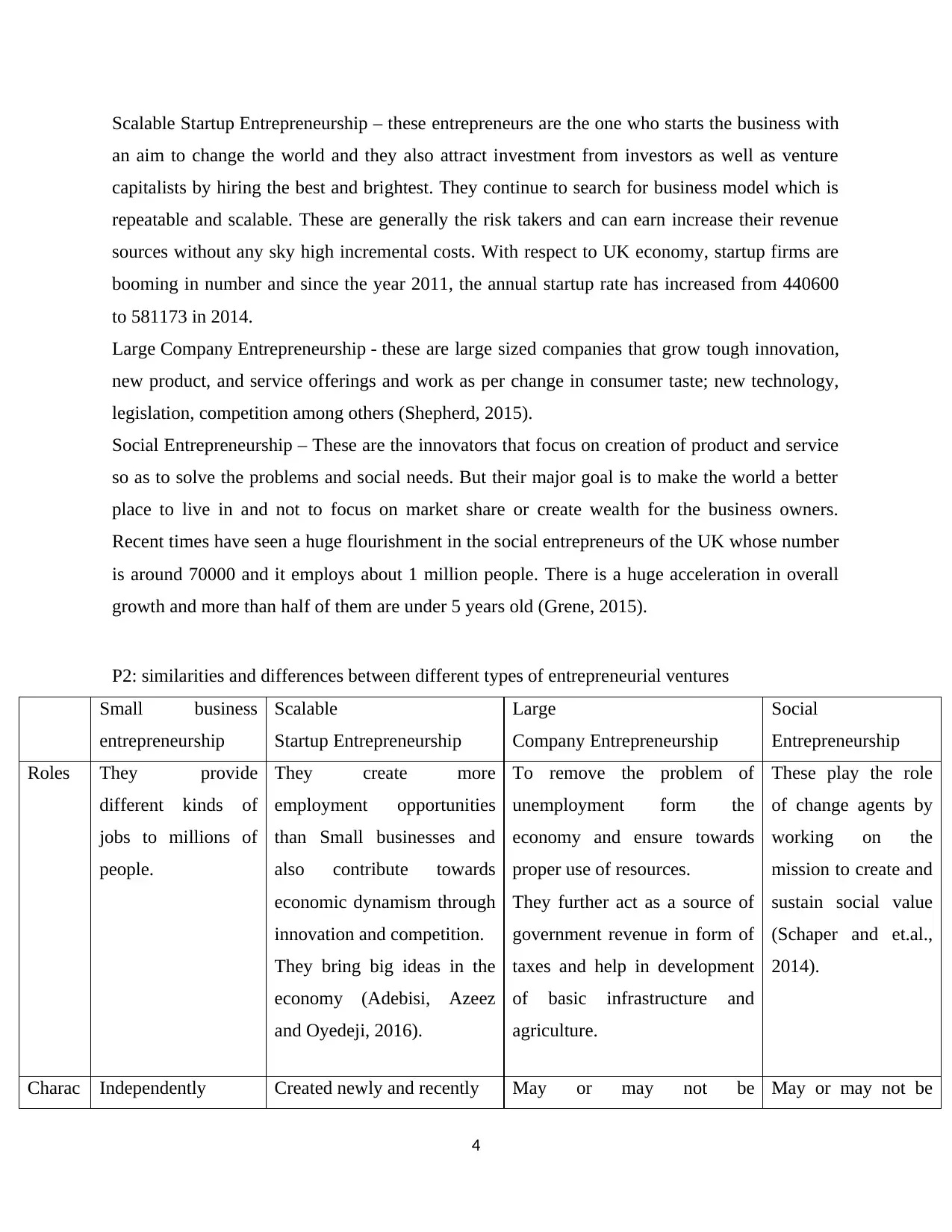
Scalable Startup Entrepreneurship – these entrepreneurs are the one who starts the business with
an aim to change the world and they also attract investment from investors as well as venture
capitalists by hiring the best and brightest. They continue to search for business model which is
repeatable and scalable. These are generally the risk takers and can earn increase their revenue
sources without any sky high incremental costs. With respect to UK economy, startup firms are
booming in number and since the year 2011, the annual startup rate has increased from 440600
to 581173 in 2014.
Large Company Entrepreneurship - these are large sized companies that grow tough innovation,
new product, and service offerings and work as per change in consumer taste; new technology,
legislation, competition among others (Shepherd, 2015).
Social Entrepreneurship – These are the innovators that focus on creation of product and service
so as to solve the problems and social needs. But their major goal is to make the world a better
place to live in and not to focus on market share or create wealth for the business owners.
Recent times have seen a huge flourishment in the social entrepreneurs of the UK whose number
is around 70000 and it employs about 1 million people. There is a huge acceleration in overall
growth and more than half of them are under 5 years old (Grene, 2015).
P2: similarities and differences between different types of entrepreneurial ventures
Small business
entrepreneurship
Scalable
Startup Entrepreneurship
Large
Company Entrepreneurship
Social
Entrepreneurship
Roles They provide
different kinds of
jobs to millions of
people.
They create more
employment opportunities
than Small businesses and
also contribute towards
economic dynamism through
innovation and competition.
They bring big ideas in the
economy (Adebisi, Azeez
and Oyedeji, 2016).
To remove the problem of
unemployment form the
economy and ensure towards
proper use of resources.
They further act as a source of
government revenue in form of
taxes and help in development
of basic infrastructure and
agriculture.
These play the role
of change agents by
working on the
mission to create and
sustain social value
(Schaper and et.al.,
2014).
Charac Independently Created newly and recently May or may not be May or may not be
4
an aim to change the world and they also attract investment from investors as well as venture
capitalists by hiring the best and brightest. They continue to search for business model which is
repeatable and scalable. These are generally the risk takers and can earn increase their revenue
sources without any sky high incremental costs. With respect to UK economy, startup firms are
booming in number and since the year 2011, the annual startup rate has increased from 440600
to 581173 in 2014.
Large Company Entrepreneurship - these are large sized companies that grow tough innovation,
new product, and service offerings and work as per change in consumer taste; new technology,
legislation, competition among others (Shepherd, 2015).
Social Entrepreneurship – These are the innovators that focus on creation of product and service
so as to solve the problems and social needs. But their major goal is to make the world a better
place to live in and not to focus on market share or create wealth for the business owners.
Recent times have seen a huge flourishment in the social entrepreneurs of the UK whose number
is around 70000 and it employs about 1 million people. There is a huge acceleration in overall
growth and more than half of them are under 5 years old (Grene, 2015).
P2: similarities and differences between different types of entrepreneurial ventures
Small business
entrepreneurship
Scalable
Startup Entrepreneurship
Large
Company Entrepreneurship
Social
Entrepreneurship
Roles They provide
different kinds of
jobs to millions of
people.
They create more
employment opportunities
than Small businesses and
also contribute towards
economic dynamism through
innovation and competition.
They bring big ideas in the
economy (Adebisi, Azeez
and Oyedeji, 2016).
To remove the problem of
unemployment form the
economy and ensure towards
proper use of resources.
They further act as a source of
government revenue in form of
taxes and help in development
of basic infrastructure and
agriculture.
These play the role
of change agents by
working on the
mission to create and
sustain social value
(Schaper and et.al.,
2014).
Charac Independently Created newly and recently May or may not be May or may not be
4
Secure Best Marks with AI Grader
Need help grading? Try our AI Grader for instant feedback on your assignments.

teristic
s
owned and operated
Closely held
ownership
Small scale in size
May or may not
intent to grow
May or may not be
scalable or
replicable
Not dominant in the
field (Morris, 2015).
No innovative
character
They need to grow quickly
by starting with a small
market and taking up bigger
ones
Require innovation to take
over competition
Small to medium scale in
size
Are scalable and replicable
May get to dominate in the
field with a course of time
independently owned or
operated
Large in terms of business size
Have a huge urge to grow
Are scalable or replicable
(Burrows, 2015).
Usually dominant in their fields
Have a presence of innovative
character
independently owned
or operated
May be large or
small in terms of
business size
Want to grow by
benefitting the
communities and
pursue new
opportunities to
serve the mission
(Schaper and et.al.,
2014).
Have a highly
innovative, adaptive
as well as learning
character.
Objecti
ves
To earn some profit
in order to feed the
family
Want to earn a good amount
of profit, sales, revenue and
market share. They further
have an objective to change
the world with their product
or service offering.
Wish to earn sales, larger
consumer base, profit,
economic power.
Also want to become a global
company and acquire monopoly
status followed by overcoming
competition (Bhachu, 2017).
Wish to excel in their
mission of bringing a
change in the
community.
5
s
owned and operated
Closely held
ownership
Small scale in size
May or may not
intent to grow
May or may not be
scalable or
replicable
Not dominant in the
field (Morris, 2015).
No innovative
character
They need to grow quickly
by starting with a small
market and taking up bigger
ones
Require innovation to take
over competition
Small to medium scale in
size
Are scalable and replicable
May get to dominate in the
field with a course of time
independently owned or
operated
Large in terms of business size
Have a huge urge to grow
Are scalable or replicable
(Burrows, 2015).
Usually dominant in their fields
Have a presence of innovative
character
independently owned
or operated
May be large or
small in terms of
business size
Want to grow by
benefitting the
communities and
pursue new
opportunities to
serve the mission
(Schaper and et.al.,
2014).
Have a highly
innovative, adaptive
as well as learning
character.
Objecti
ves
To earn some profit
in order to feed the
family
Want to earn a good amount
of profit, sales, revenue and
market share. They further
have an objective to change
the world with their product
or service offering.
Wish to earn sales, larger
consumer base, profit,
economic power.
Also want to become a global
company and acquire monopoly
status followed by overcoming
competition (Bhachu, 2017).
Wish to excel in their
mission of bringing a
change in the
community.
5
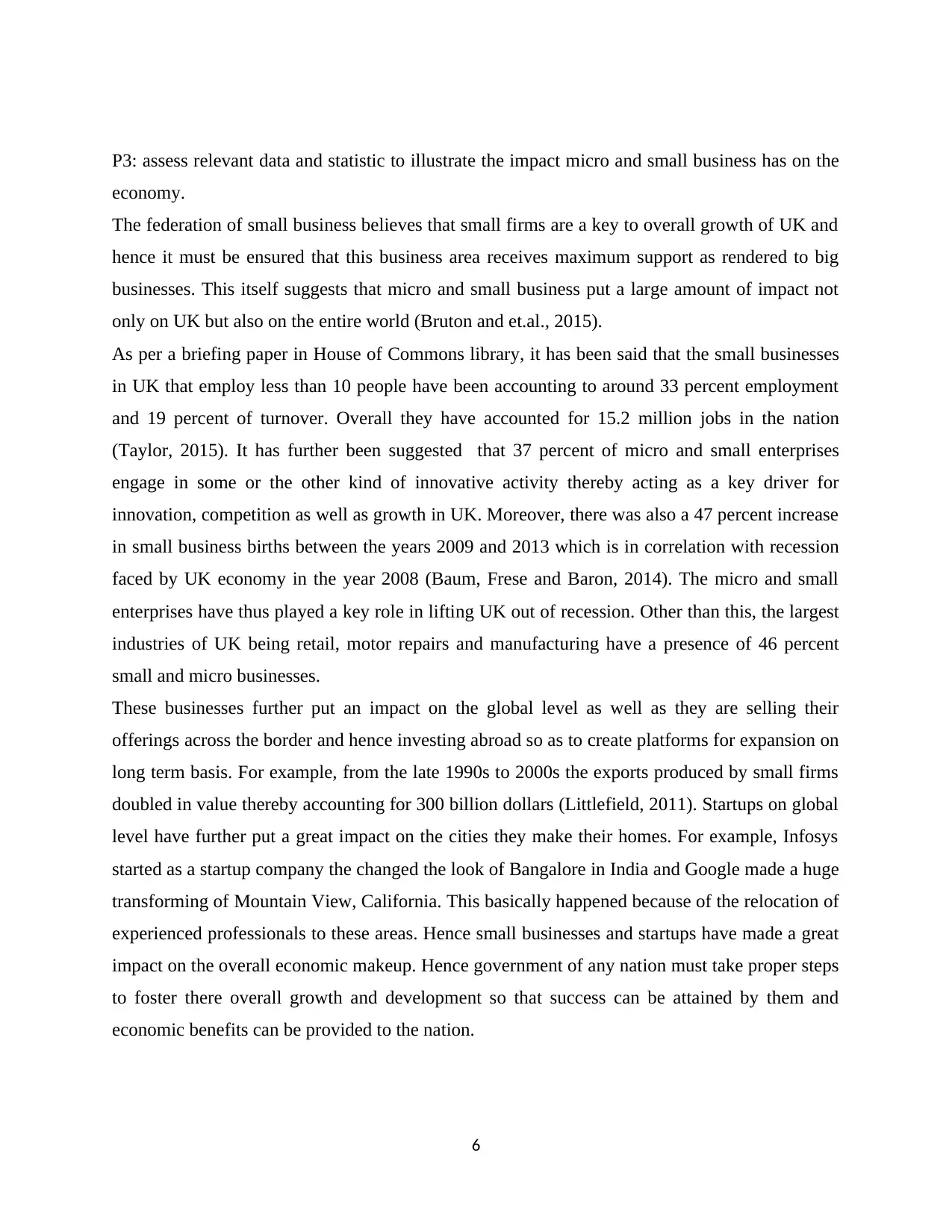
P3: assess relevant data and statistic to illustrate the impact micro and small business has on the
economy.
The federation of small business believes that small firms are a key to overall growth of UK and
hence it must be ensured that this business area receives maximum support as rendered to big
businesses. This itself suggests that micro and small business put a large amount of impact not
only on UK but also on the entire world (Bruton and et.al., 2015).
As per a briefing paper in House of Commons library, it has been said that the small businesses
in UK that employ less than 10 people have been accounting to around 33 percent employment
and 19 percent of turnover. Overall they have accounted for 15.2 million jobs in the nation
(Taylor, 2015). It has further been suggested that 37 percent of micro and small enterprises
engage in some or the other kind of innovative activity thereby acting as a key driver for
innovation, competition as well as growth in UK. Moreover, there was also a 47 percent increase
in small business births between the years 2009 and 2013 which is in correlation with recession
faced by UK economy in the year 2008 (Baum, Frese and Baron, 2014). The micro and small
enterprises have thus played a key role in lifting UK out of recession. Other than this, the largest
industries of UK being retail, motor repairs and manufacturing have a presence of 46 percent
small and micro businesses.
These businesses further put an impact on the global level as well as they are selling their
offerings across the border and hence investing abroad so as to create platforms for expansion on
long term basis. For example, from the late 1990s to 2000s the exports produced by small firms
doubled in value thereby accounting for 300 billion dollars (Littlefield, 2011). Startups on global
level have further put a great impact on the cities they make their homes. For example, Infosys
started as a startup company the changed the look of Bangalore in India and Google made a huge
transforming of Mountain View, California. This basically happened because of the relocation of
experienced professionals to these areas. Hence small businesses and startups have made a great
impact on the overall economic makeup. Hence government of any nation must take proper steps
to foster there overall growth and development so that success can be attained by them and
economic benefits can be provided to the nation.
6
economy.
The federation of small business believes that small firms are a key to overall growth of UK and
hence it must be ensured that this business area receives maximum support as rendered to big
businesses. This itself suggests that micro and small business put a large amount of impact not
only on UK but also on the entire world (Bruton and et.al., 2015).
As per a briefing paper in House of Commons library, it has been said that the small businesses
in UK that employ less than 10 people have been accounting to around 33 percent employment
and 19 percent of turnover. Overall they have accounted for 15.2 million jobs in the nation
(Taylor, 2015). It has further been suggested that 37 percent of micro and small enterprises
engage in some or the other kind of innovative activity thereby acting as a key driver for
innovation, competition as well as growth in UK. Moreover, there was also a 47 percent increase
in small business births between the years 2009 and 2013 which is in correlation with recession
faced by UK economy in the year 2008 (Baum, Frese and Baron, 2014). The micro and small
enterprises have thus played a key role in lifting UK out of recession. Other than this, the largest
industries of UK being retail, motor repairs and manufacturing have a presence of 46 percent
small and micro businesses.
These businesses further put an impact on the global level as well as they are selling their
offerings across the border and hence investing abroad so as to create platforms for expansion on
long term basis. For example, from the late 1990s to 2000s the exports produced by small firms
doubled in value thereby accounting for 300 billion dollars (Littlefield, 2011). Startups on global
level have further put a great impact on the cities they make their homes. For example, Infosys
started as a startup company the changed the look of Bangalore in India and Google made a huge
transforming of Mountain View, California. This basically happened because of the relocation of
experienced professionals to these areas. Hence small businesses and startups have made a great
impact on the overall economic makeup. Hence government of any nation must take proper steps
to foster there overall growth and development so that success can be attained by them and
economic benefits can be provided to the nation.
6
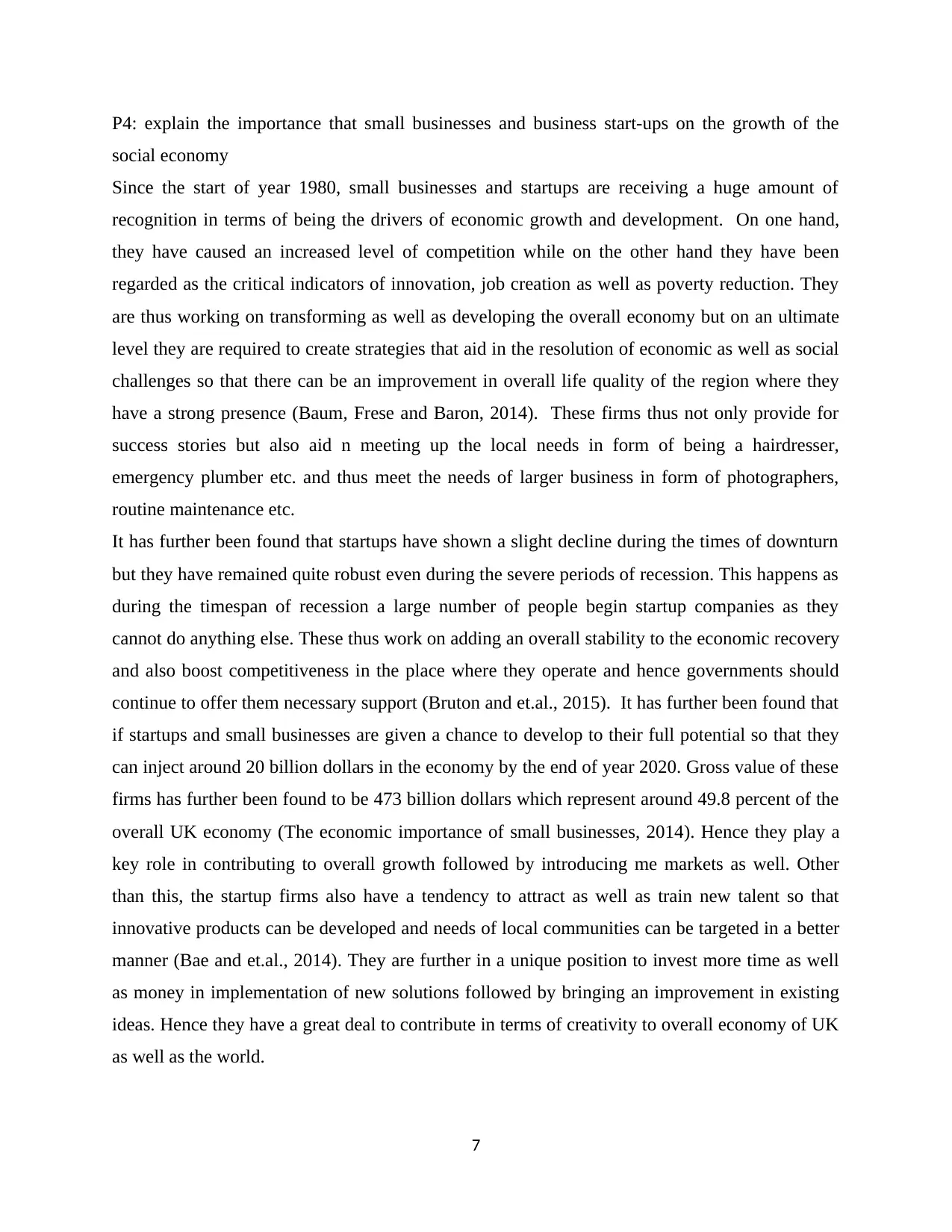
P4: explain the importance that small businesses and business start-ups on the growth of the
social economy
Since the start of year 1980, small businesses and startups are receiving a huge amount of
recognition in terms of being the drivers of economic growth and development. On one hand,
they have caused an increased level of competition while on the other hand they have been
regarded as the critical indicators of innovation, job creation as well as poverty reduction. They
are thus working on transforming as well as developing the overall economy but on an ultimate
level they are required to create strategies that aid in the resolution of economic as well as social
challenges so that there can be an improvement in overall life quality of the region where they
have a strong presence (Baum, Frese and Baron, 2014). These firms thus not only provide for
success stories but also aid n meeting up the local needs in form of being a hairdresser,
emergency plumber etc. and thus meet the needs of larger business in form of photographers,
routine maintenance etc.
It has further been found that startups have shown a slight decline during the times of downturn
but they have remained quite robust even during the severe periods of recession. This happens as
during the timespan of recession a large number of people begin startup companies as they
cannot do anything else. These thus work on adding an overall stability to the economic recovery
and also boost competitiveness in the place where they operate and hence governments should
continue to offer them necessary support (Bruton and et.al., 2015). It has further been found that
if startups and small businesses are given a chance to develop to their full potential so that they
can inject around 20 billion dollars in the economy by the end of year 2020. Gross value of these
firms has further been found to be 473 billion dollars which represent around 49.8 percent of the
overall UK economy (The economic importance of small businesses, 2014). Hence they play a
key role in contributing to overall growth followed by introducing me markets as well. Other
than this, the startup firms also have a tendency to attract as well as train new talent so that
innovative products can be developed and needs of local communities can be targeted in a better
manner (Bae and et.al., 2014). They are further in a unique position to invest more time as well
as money in implementation of new solutions followed by bringing an improvement in existing
ideas. Hence they have a great deal to contribute in terms of creativity to overall economy of UK
as well as the world.
7
social economy
Since the start of year 1980, small businesses and startups are receiving a huge amount of
recognition in terms of being the drivers of economic growth and development. On one hand,
they have caused an increased level of competition while on the other hand they have been
regarded as the critical indicators of innovation, job creation as well as poverty reduction. They
are thus working on transforming as well as developing the overall economy but on an ultimate
level they are required to create strategies that aid in the resolution of economic as well as social
challenges so that there can be an improvement in overall life quality of the region where they
have a strong presence (Baum, Frese and Baron, 2014). These firms thus not only provide for
success stories but also aid n meeting up the local needs in form of being a hairdresser,
emergency plumber etc. and thus meet the needs of larger business in form of photographers,
routine maintenance etc.
It has further been found that startups have shown a slight decline during the times of downturn
but they have remained quite robust even during the severe periods of recession. This happens as
during the timespan of recession a large number of people begin startup companies as they
cannot do anything else. These thus work on adding an overall stability to the economic recovery
and also boost competitiveness in the place where they operate and hence governments should
continue to offer them necessary support (Bruton and et.al., 2015). It has further been found that
if startups and small businesses are given a chance to develop to their full potential so that they
can inject around 20 billion dollars in the economy by the end of year 2020. Gross value of these
firms has further been found to be 473 billion dollars which represent around 49.8 percent of the
overall UK economy (The economic importance of small businesses, 2014). Hence they play a
key role in contributing to overall growth followed by introducing me markets as well. Other
than this, the startup firms also have a tendency to attract as well as train new talent so that
innovative products can be developed and needs of local communities can be targeted in a better
manner (Bae and et.al., 2014). They are further in a unique position to invest more time as well
as money in implementation of new solutions followed by bringing an improvement in existing
ideas. Hence they have a great deal to contribute in terms of creativity to overall economy of UK
as well as the world.
7
Paraphrase This Document
Need a fresh take? Get an instant paraphrase of this document with our AI Paraphraser
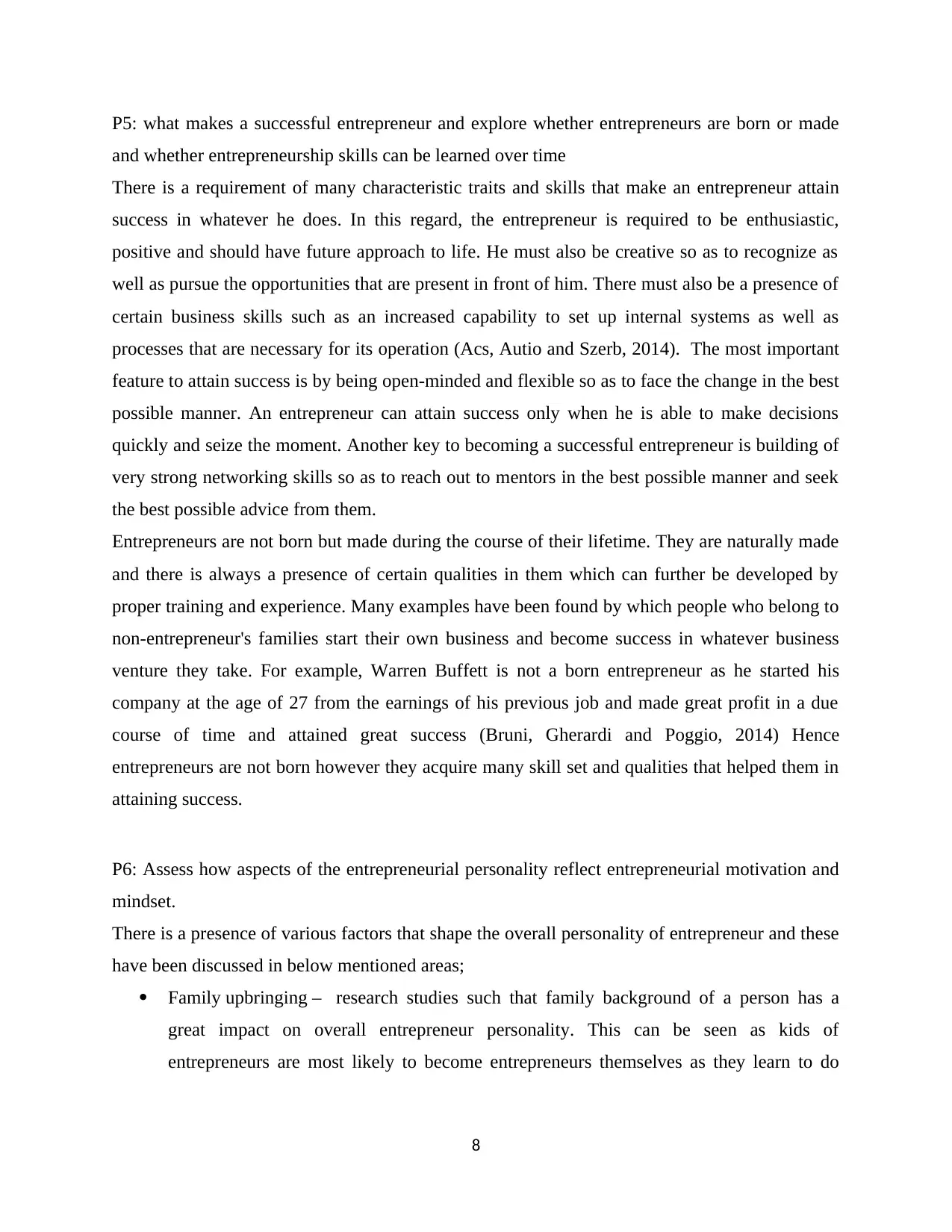
P5: what makes a successful entrepreneur and explore whether entrepreneurs are born or made
and whether entrepreneurship skills can be learned over time
There is a requirement of many characteristic traits and skills that make an entrepreneur attain
success in whatever he does. In this regard, the entrepreneur is required to be enthusiastic,
positive and should have future approach to life. He must also be creative so as to recognize as
well as pursue the opportunities that are present in front of him. There must also be a presence of
certain business skills such as an increased capability to set up internal systems as well as
processes that are necessary for its operation (Acs, Autio and Szerb, 2014). The most important
feature to attain success is by being open-minded and flexible so as to face the change in the best
possible manner. An entrepreneur can attain success only when he is able to make decisions
quickly and seize the moment. Another key to becoming a successful entrepreneur is building of
very strong networking skills so as to reach out to mentors in the best possible manner and seek
the best possible advice from them.
Entrepreneurs are not born but made during the course of their lifetime. They are naturally made
and there is always a presence of certain qualities in them which can further be developed by
proper training and experience. Many examples have been found by which people who belong to
non-entrepreneur's families start their own business and become success in whatever business
venture they take. For example, Warren Buffett is not a born entrepreneur as he started his
company at the age of 27 from the earnings of his previous job and made great profit in a due
course of time and attained great success (Bruni, Gherardi and Poggio, 2014) Hence
entrepreneurs are not born however they acquire many skill set and qualities that helped them in
attaining success.
P6: Assess how aspects of the entrepreneurial personality reflect entrepreneurial motivation and
mindset.
There is a presence of various factors that shape the overall personality of entrepreneur and these
have been discussed in below mentioned areas;
Family upbringing – research studies such that family background of a person has a
great impact on overall entrepreneur personality. This can be seen as kids of
entrepreneurs are most likely to become entrepreneurs themselves as they learn to do
8
and whether entrepreneurship skills can be learned over time
There is a requirement of many characteristic traits and skills that make an entrepreneur attain
success in whatever he does. In this regard, the entrepreneur is required to be enthusiastic,
positive and should have future approach to life. He must also be creative so as to recognize as
well as pursue the opportunities that are present in front of him. There must also be a presence of
certain business skills such as an increased capability to set up internal systems as well as
processes that are necessary for its operation (Acs, Autio and Szerb, 2014). The most important
feature to attain success is by being open-minded and flexible so as to face the change in the best
possible manner. An entrepreneur can attain success only when he is able to make decisions
quickly and seize the moment. Another key to becoming a successful entrepreneur is building of
very strong networking skills so as to reach out to mentors in the best possible manner and seek
the best possible advice from them.
Entrepreneurs are not born but made during the course of their lifetime. They are naturally made
and there is always a presence of certain qualities in them which can further be developed by
proper training and experience. Many examples have been found by which people who belong to
non-entrepreneur's families start their own business and become success in whatever business
venture they take. For example, Warren Buffett is not a born entrepreneur as he started his
company at the age of 27 from the earnings of his previous job and made great profit in a due
course of time and attained great success (Bruni, Gherardi and Poggio, 2014) Hence
entrepreneurs are not born however they acquire many skill set and qualities that helped them in
attaining success.
P6: Assess how aspects of the entrepreneurial personality reflect entrepreneurial motivation and
mindset.
There is a presence of various factors that shape the overall personality of entrepreneur and these
have been discussed in below mentioned areas;
Family upbringing – research studies such that family background of a person has a
great impact on overall entrepreneur personality. This can be seen as kids of
entrepreneurs are most likely to become entrepreneurs themselves as they learn to do
8
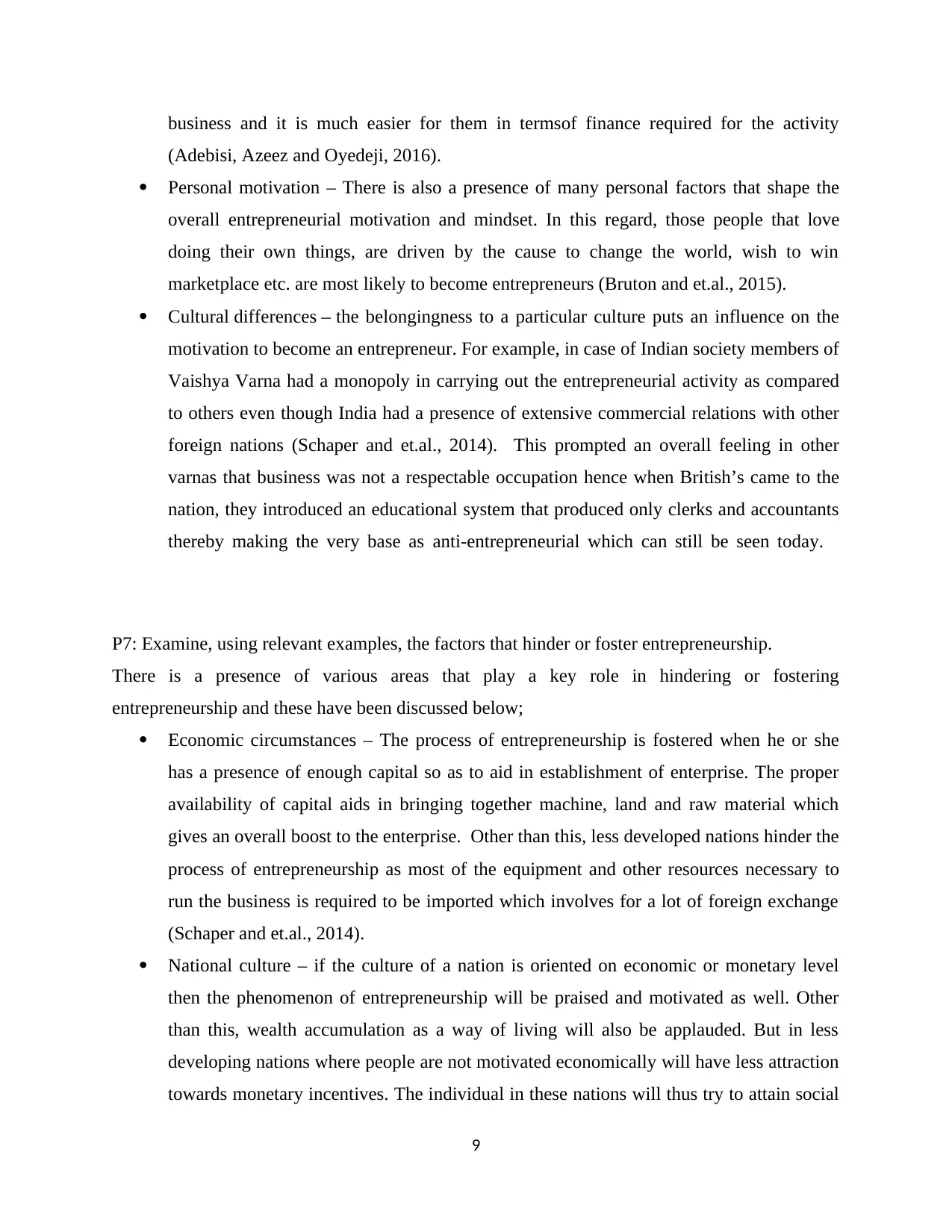
business and it is much easier for them in termsof finance required for the activity
(Adebisi, Azeez and Oyedeji, 2016).
Personal motivation – There is also a presence of many personal factors that shape the
overall entrepreneurial motivation and mindset. In this regard, those people that love
doing their own things, are driven by the cause to change the world, wish to win
marketplace etc. are most likely to become entrepreneurs (Bruton and et.al., 2015).
Cultural differences – the belongingness to a particular culture puts an influence on the
motivation to become an entrepreneur. For example, in case of Indian society members of
Vaishya Varna had a monopoly in carrying out the entrepreneurial activity as compared
to others even though India had a presence of extensive commercial relations with other
foreign nations (Schaper and et.al., 2014). This prompted an overall feeling in other
varnas that business was not a respectable occupation hence when British’s came to the
nation, they introduced an educational system that produced only clerks and accountants
thereby making the very base as anti-entrepreneurial which can still be seen today.
P7: Examine, using relevant examples, the factors that hinder or foster entrepreneurship.
There is a presence of various areas that play a key role in hindering or fostering
entrepreneurship and these have been discussed below;
Economic circumstances – The process of entrepreneurship is fostered when he or she
has a presence of enough capital so as to aid in establishment of enterprise. The proper
availability of capital aids in bringing together machine, land and raw material which
gives an overall boost to the enterprise. Other than this, less developed nations hinder the
process of entrepreneurship as most of the equipment and other resources necessary to
run the business is required to be imported which involves for a lot of foreign exchange
(Schaper and et.al., 2014).
National culture – if the culture of a nation is oriented on economic or monetary level
then the phenomenon of entrepreneurship will be praised and motivated as well. Other
than this, wealth accumulation as a way of living will also be applauded. But in less
developing nations where people are not motivated economically will have less attraction
towards monetary incentives. The individual in these nations will thus try to attain social
9
(Adebisi, Azeez and Oyedeji, 2016).
Personal motivation – There is also a presence of many personal factors that shape the
overall entrepreneurial motivation and mindset. In this regard, those people that love
doing their own things, are driven by the cause to change the world, wish to win
marketplace etc. are most likely to become entrepreneurs (Bruton and et.al., 2015).
Cultural differences – the belongingness to a particular culture puts an influence on the
motivation to become an entrepreneur. For example, in case of Indian society members of
Vaishya Varna had a monopoly in carrying out the entrepreneurial activity as compared
to others even though India had a presence of extensive commercial relations with other
foreign nations (Schaper and et.al., 2014). This prompted an overall feeling in other
varnas that business was not a respectable occupation hence when British’s came to the
nation, they introduced an educational system that produced only clerks and accountants
thereby making the very base as anti-entrepreneurial which can still be seen today.
P7: Examine, using relevant examples, the factors that hinder or foster entrepreneurship.
There is a presence of various areas that play a key role in hindering or fostering
entrepreneurship and these have been discussed below;
Economic circumstances – The process of entrepreneurship is fostered when he or she
has a presence of enough capital so as to aid in establishment of enterprise. The proper
availability of capital aids in bringing together machine, land and raw material which
gives an overall boost to the enterprise. Other than this, less developed nations hinder the
process of entrepreneurship as most of the equipment and other resources necessary to
run the business is required to be imported which involves for a lot of foreign exchange
(Schaper and et.al., 2014).
National culture – if the culture of a nation is oriented on economic or monetary level
then the phenomenon of entrepreneurship will be praised and motivated as well. Other
than this, wealth accumulation as a way of living will also be applauded. But in less
developing nations where people are not motivated economically will have less attraction
towards monetary incentives. The individual in these nations will thus try to attain social
9
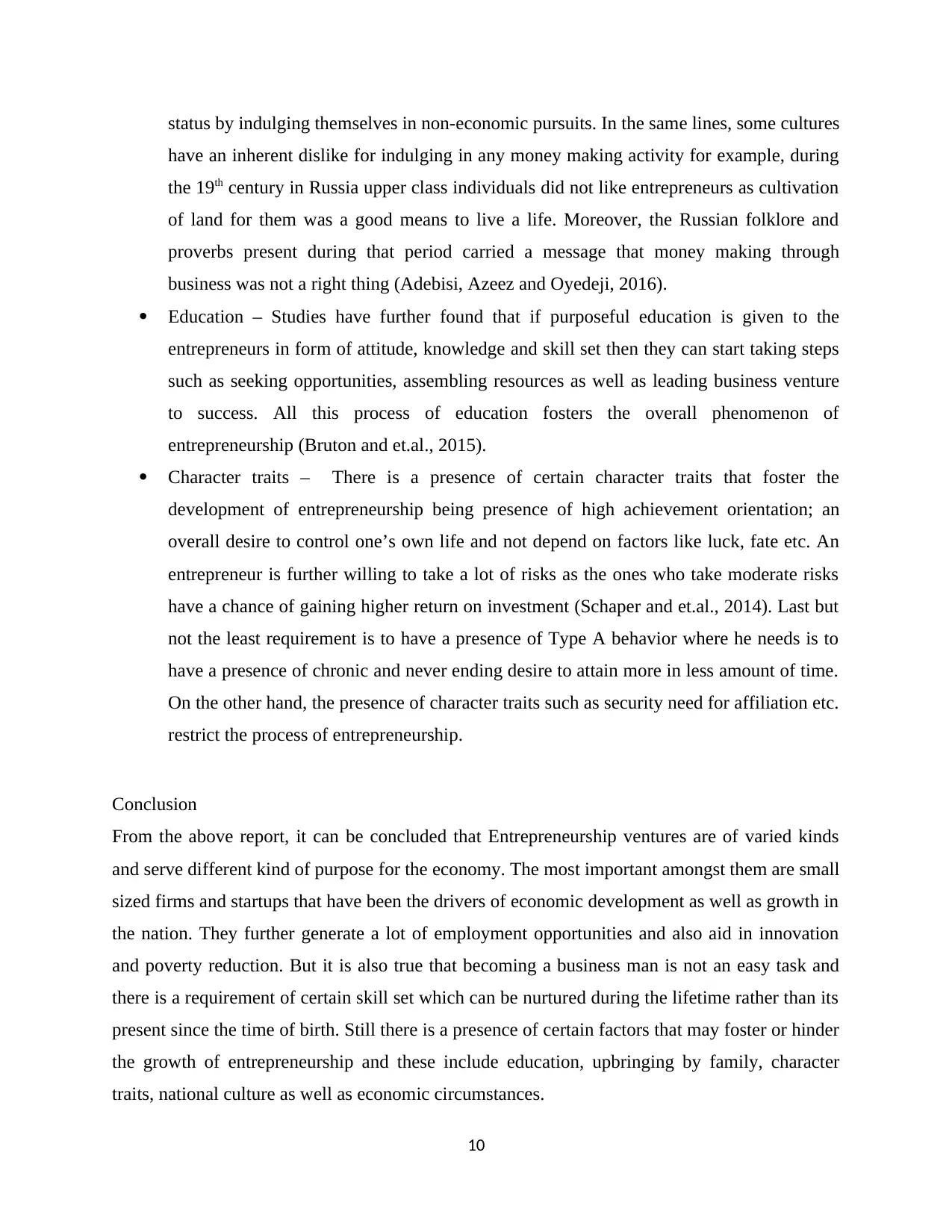
status by indulging themselves in non-economic pursuits. In the same lines, some cultures
have an inherent dislike for indulging in any money making activity for example, during
the 19th century in Russia upper class individuals did not like entrepreneurs as cultivation
of land for them was a good means to live a life. Moreover, the Russian folklore and
proverbs present during that period carried a message that money making through
business was not a right thing (Adebisi, Azeez and Oyedeji, 2016).
Education – Studies have further found that if purposeful education is given to the
entrepreneurs in form of attitude, knowledge and skill set then they can start taking steps
such as seeking opportunities, assembling resources as well as leading business venture
to success. All this process of education fosters the overall phenomenon of
entrepreneurship (Bruton and et.al., 2015).
Character traits – There is a presence of certain character traits that foster the
development of entrepreneurship being presence of high achievement orientation; an
overall desire to control one’s own life and not depend on factors like luck, fate etc. An
entrepreneur is further willing to take a lot of risks as the ones who take moderate risks
have a chance of gaining higher return on investment (Schaper and et.al., 2014). Last but
not the least requirement is to have a presence of Type A behavior where he needs is to
have a presence of chronic and never ending desire to attain more in less amount of time.
On the other hand, the presence of character traits such as security need for affiliation etc.
restrict the process of entrepreneurship.
Conclusion
From the above report, it can be concluded that Entrepreneurship ventures are of varied kinds
and serve different kind of purpose for the economy. The most important amongst them are small
sized firms and startups that have been the drivers of economic development as well as growth in
the nation. They further generate a lot of employment opportunities and also aid in innovation
and poverty reduction. But it is also true that becoming a business man is not an easy task and
there is a requirement of certain skill set which can be nurtured during the lifetime rather than its
present since the time of birth. Still there is a presence of certain factors that may foster or hinder
the growth of entrepreneurship and these include education, upbringing by family, character
traits, national culture as well as economic circumstances.
10
have an inherent dislike for indulging in any money making activity for example, during
the 19th century in Russia upper class individuals did not like entrepreneurs as cultivation
of land for them was a good means to live a life. Moreover, the Russian folklore and
proverbs present during that period carried a message that money making through
business was not a right thing (Adebisi, Azeez and Oyedeji, 2016).
Education – Studies have further found that if purposeful education is given to the
entrepreneurs in form of attitude, knowledge and skill set then they can start taking steps
such as seeking opportunities, assembling resources as well as leading business venture
to success. All this process of education fosters the overall phenomenon of
entrepreneurship (Bruton and et.al., 2015).
Character traits – There is a presence of certain character traits that foster the
development of entrepreneurship being presence of high achievement orientation; an
overall desire to control one’s own life and not depend on factors like luck, fate etc. An
entrepreneur is further willing to take a lot of risks as the ones who take moderate risks
have a chance of gaining higher return on investment (Schaper and et.al., 2014). Last but
not the least requirement is to have a presence of Type A behavior where he needs is to
have a presence of chronic and never ending desire to attain more in less amount of time.
On the other hand, the presence of character traits such as security need for affiliation etc.
restrict the process of entrepreneurship.
Conclusion
From the above report, it can be concluded that Entrepreneurship ventures are of varied kinds
and serve different kind of purpose for the economy. The most important amongst them are small
sized firms and startups that have been the drivers of economic development as well as growth in
the nation. They further generate a lot of employment opportunities and also aid in innovation
and poverty reduction. But it is also true that becoming a business man is not an easy task and
there is a requirement of certain skill set which can be nurtured during the lifetime rather than its
present since the time of birth. Still there is a presence of certain factors that may foster or hinder
the growth of entrepreneurship and these include education, upbringing by family, character
traits, national culture as well as economic circumstances.
10
Secure Best Marks with AI Grader
Need help grading? Try our AI Grader for instant feedback on your assignments.
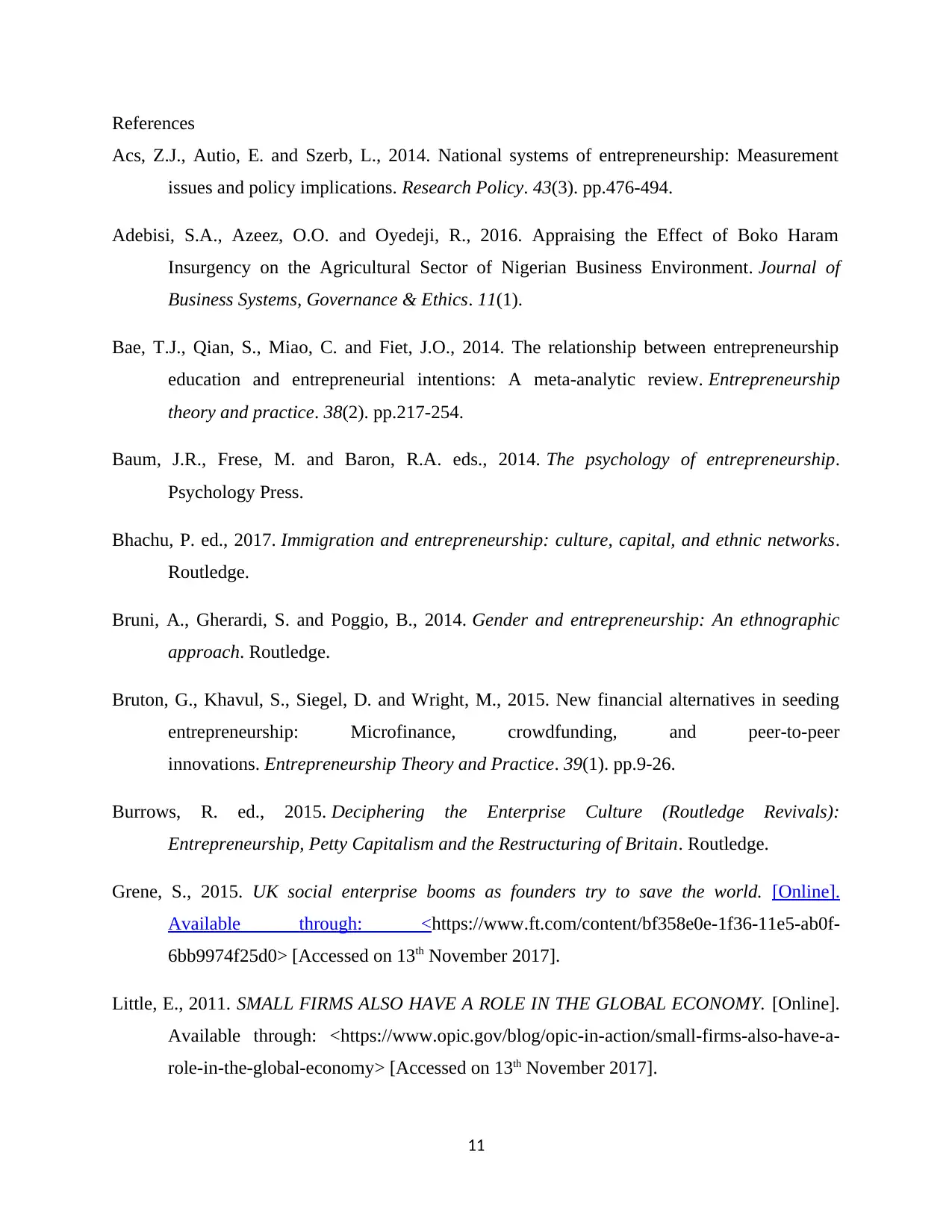
References
Acs, Z.J., Autio, E. and Szerb, L., 2014. National systems of entrepreneurship: Measurement
issues and policy implications. Research Policy. 43(3). pp.476-494.
Adebisi, S.A., Azeez, O.O. and Oyedeji, R., 2016. Appraising the Effect of Boko Haram
Insurgency on the Agricultural Sector of Nigerian Business Environment. Journal of
Business Systems, Governance & Ethics. 11(1).
Bae, T.J., Qian, S., Miao, C. and Fiet, J.O., 2014. The relationship between entrepreneurship
education and entrepreneurial intentions: A meta‐analytic review. Entrepreneurship
theory and practice. 38(2). pp.217-254.
Baum, J.R., Frese, M. and Baron, R.A. eds., 2014. The psychology of entrepreneurship.
Psychology Press.
Bhachu, P. ed., 2017. Immigration and entrepreneurship: culture, capital, and ethnic networks.
Routledge.
Bruni, A., Gherardi, S. and Poggio, B., 2014. Gender and entrepreneurship: An ethnographic
approach. Routledge.
Bruton, G., Khavul, S., Siegel, D. and Wright, M., 2015. New financial alternatives in seeding
entrepreneurship: Microfinance, crowdfunding, and peer‐to‐peer
innovations. Entrepreneurship Theory and Practice. 39(1). pp.9-26.
Burrows, R. ed., 2015. Deciphering the Enterprise Culture (Routledge Revivals):
Entrepreneurship, Petty Capitalism and the Restructuring of Britain. Routledge.
Grene, S., 2015. UK social enterprise booms as founders try to save the world. [Online].
Available through: <https://www.ft.com/content/bf358e0e-1f36-11e5-ab0f-
6bb9974f25d0> [Accessed on 13th November 2017].
Little, E., 2011. SMALL FIRMS ALSO HAVE A ROLE IN THE GLOBAL ECONOMY. [Online].
Available through: <https://www.opic.gov/blog/opic-in-action/small-firms-also-have-a-
role-in-the-global-economy> [Accessed on 13th November 2017].
11
Acs, Z.J., Autio, E. and Szerb, L., 2014. National systems of entrepreneurship: Measurement
issues and policy implications. Research Policy. 43(3). pp.476-494.
Adebisi, S.A., Azeez, O.O. and Oyedeji, R., 2016. Appraising the Effect of Boko Haram
Insurgency on the Agricultural Sector of Nigerian Business Environment. Journal of
Business Systems, Governance & Ethics. 11(1).
Bae, T.J., Qian, S., Miao, C. and Fiet, J.O., 2014. The relationship between entrepreneurship
education and entrepreneurial intentions: A meta‐analytic review. Entrepreneurship
theory and practice. 38(2). pp.217-254.
Baum, J.R., Frese, M. and Baron, R.A. eds., 2014. The psychology of entrepreneurship.
Psychology Press.
Bhachu, P. ed., 2017. Immigration and entrepreneurship: culture, capital, and ethnic networks.
Routledge.
Bruni, A., Gherardi, S. and Poggio, B., 2014. Gender and entrepreneurship: An ethnographic
approach. Routledge.
Bruton, G., Khavul, S., Siegel, D. and Wright, M., 2015. New financial alternatives in seeding
entrepreneurship: Microfinance, crowdfunding, and peer‐to‐peer
innovations. Entrepreneurship Theory and Practice. 39(1). pp.9-26.
Burrows, R. ed., 2015. Deciphering the Enterprise Culture (Routledge Revivals):
Entrepreneurship, Petty Capitalism and the Restructuring of Britain. Routledge.
Grene, S., 2015. UK social enterprise booms as founders try to save the world. [Online].
Available through: <https://www.ft.com/content/bf358e0e-1f36-11e5-ab0f-
6bb9974f25d0> [Accessed on 13th November 2017].
Little, E., 2011. SMALL FIRMS ALSO HAVE A ROLE IN THE GLOBAL ECONOMY. [Online].
Available through: <https://www.opic.gov/blog/opic-in-action/small-firms-also-have-a-
role-in-the-global-economy> [Accessed on 13th November 2017].
11
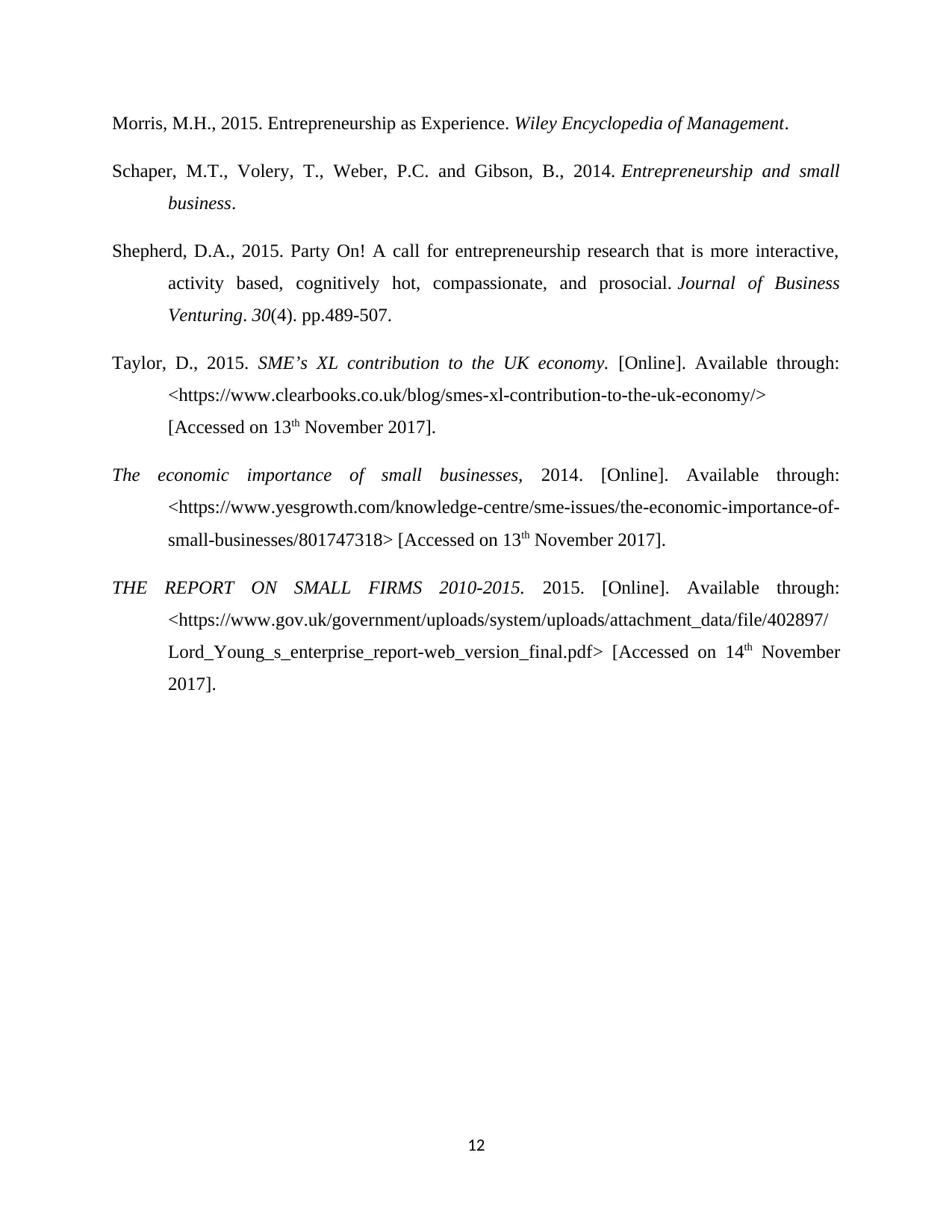
Morris, M.H., 2015. Entrepreneurship as Experience. Wiley Encyclopedia of Management.
Schaper, M.T., Volery, T., Weber, P.C. and Gibson, B., 2014. Entrepreneurship and small
business.
Shepherd, D.A., 2015. Party On! A call for entrepreneurship research that is more interactive,
activity based, cognitively hot, compassionate, and prosocial. Journal of Business
Venturing. 30(4). pp.489-507.
Taylor, D., 2015. SME’s XL contribution to the UK economy. [Online]. Available through:
<https://www.clearbooks.co.uk/blog/smes-xl-contribution-to-the-uk-economy/>
[Accessed on 13th November 2017].
The economic importance of small businesses, 2014. [Online]. Available through:
<https://www.yesgrowth.com/knowledge-centre/sme-issues/the-economic-importance-of-
small-businesses/801747318> [Accessed on 13th November 2017].
THE REPORT ON SMALL FIRMS 2010-2015. 2015. [Online]. Available through:
<https://www.gov.uk/government/uploads/system/uploads/attachment_data/file/402897/
Lord_Young_s_enterprise_report-web_version_final.pdf> [Accessed on 14th November
2017].
12
Schaper, M.T., Volery, T., Weber, P.C. and Gibson, B., 2014. Entrepreneurship and small
business.
Shepherd, D.A., 2015. Party On! A call for entrepreneurship research that is more interactive,
activity based, cognitively hot, compassionate, and prosocial. Journal of Business
Venturing. 30(4). pp.489-507.
Taylor, D., 2015. SME’s XL contribution to the UK economy. [Online]. Available through:
<https://www.clearbooks.co.uk/blog/smes-xl-contribution-to-the-uk-economy/>
[Accessed on 13th November 2017].
The economic importance of small businesses, 2014. [Online]. Available through:
<https://www.yesgrowth.com/knowledge-centre/sme-issues/the-economic-importance-of-
small-businesses/801747318> [Accessed on 13th November 2017].
THE REPORT ON SMALL FIRMS 2010-2015. 2015. [Online]. Available through:
<https://www.gov.uk/government/uploads/system/uploads/attachment_data/file/402897/
Lord_Young_s_enterprise_report-web_version_final.pdf> [Accessed on 14th November
2017].
12
1 out of 12
Related Documents
Your All-in-One AI-Powered Toolkit for Academic Success.
+13062052269
info@desklib.com
Available 24*7 on WhatsApp / Email
![[object Object]](/_next/static/media/star-bottom.7253800d.svg)
Unlock your academic potential
© 2024 | Zucol Services PVT LTD | All rights reserved.




